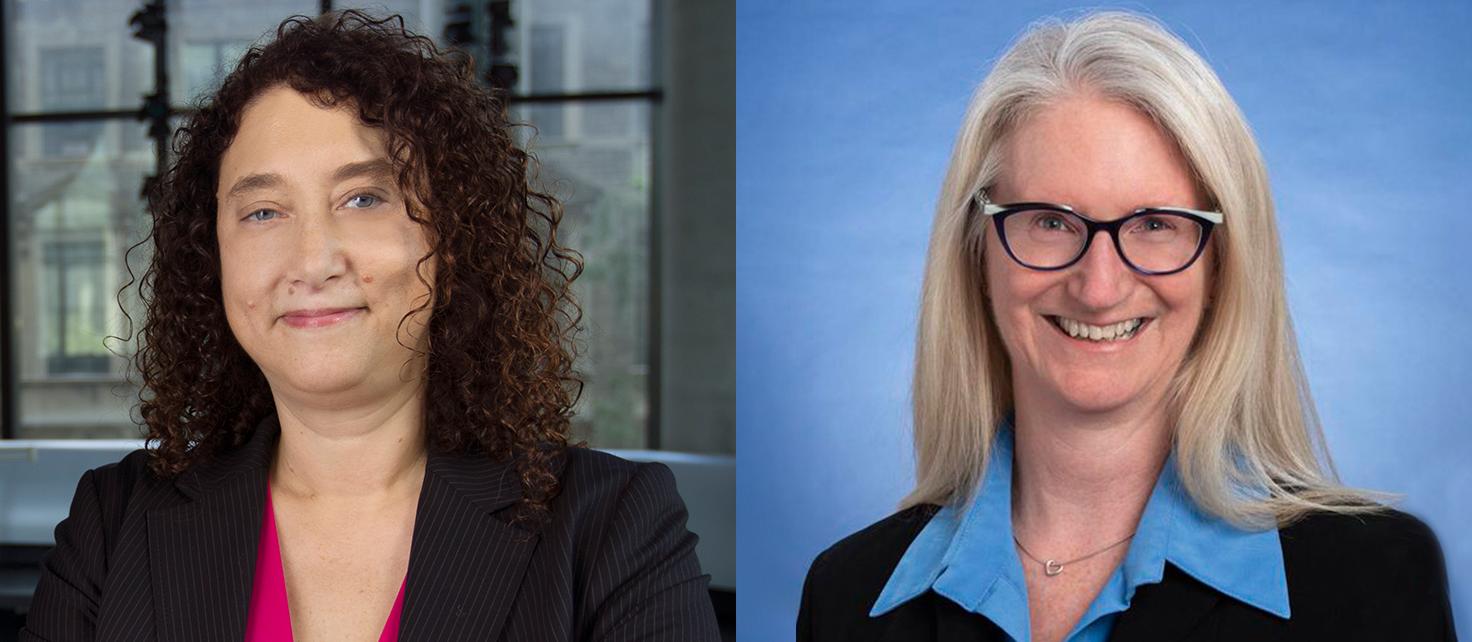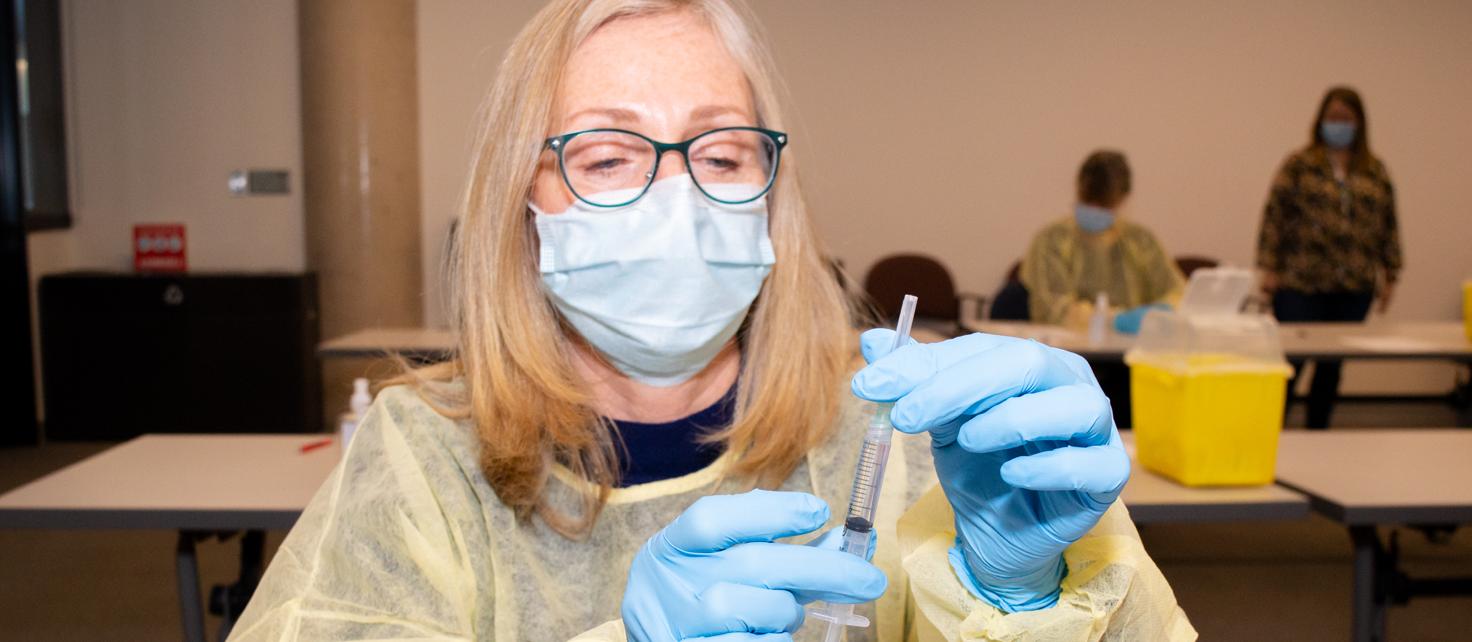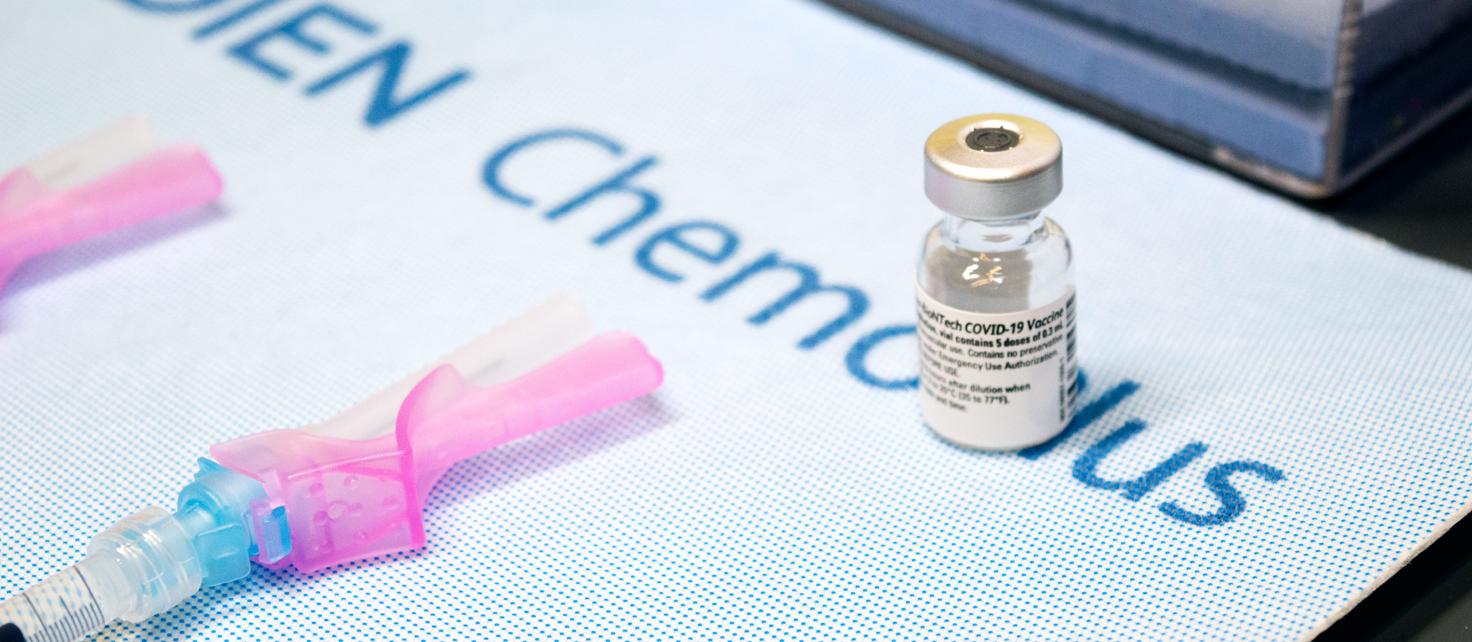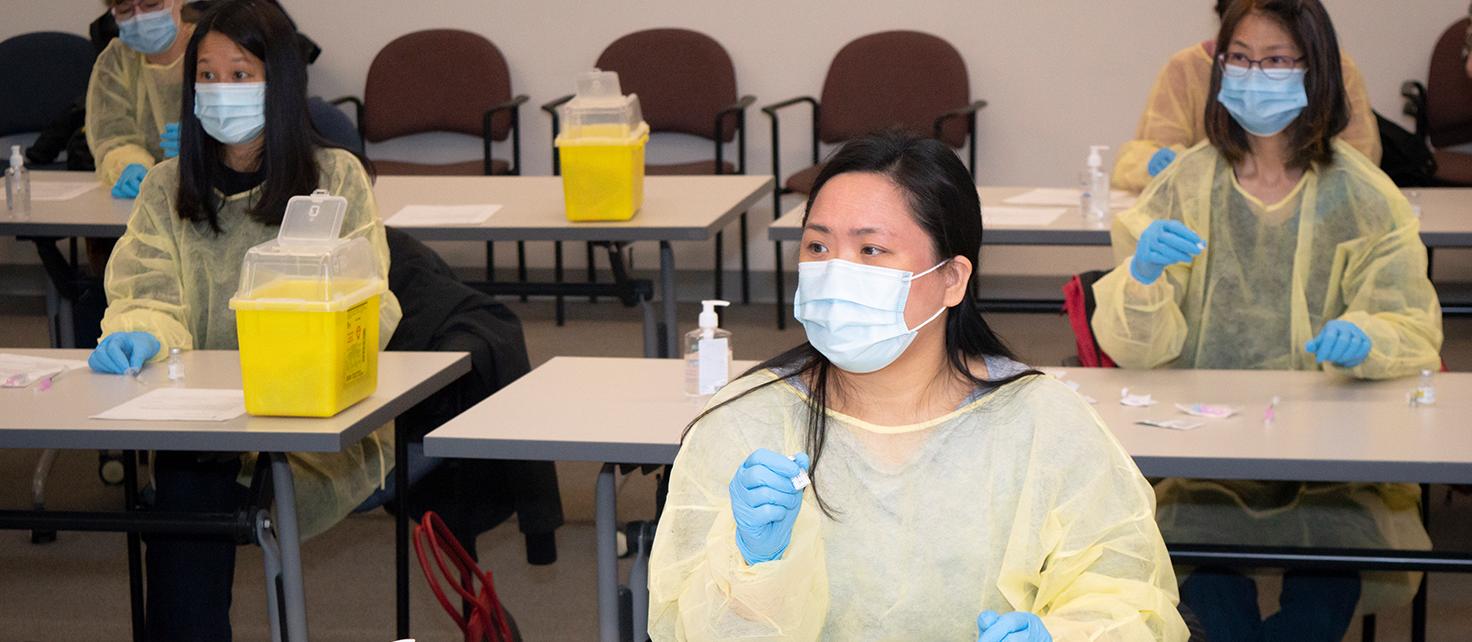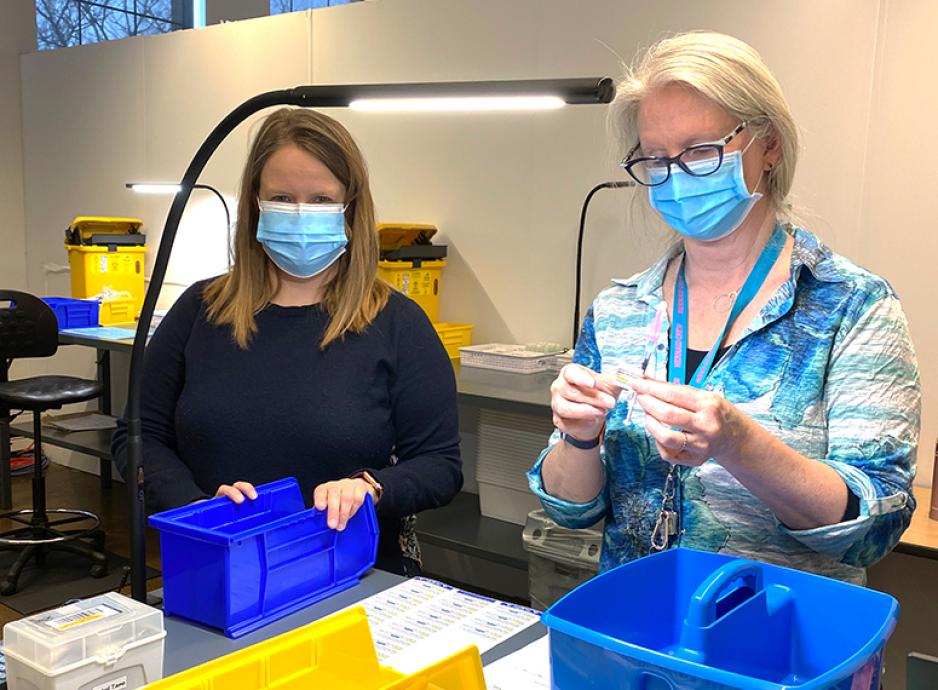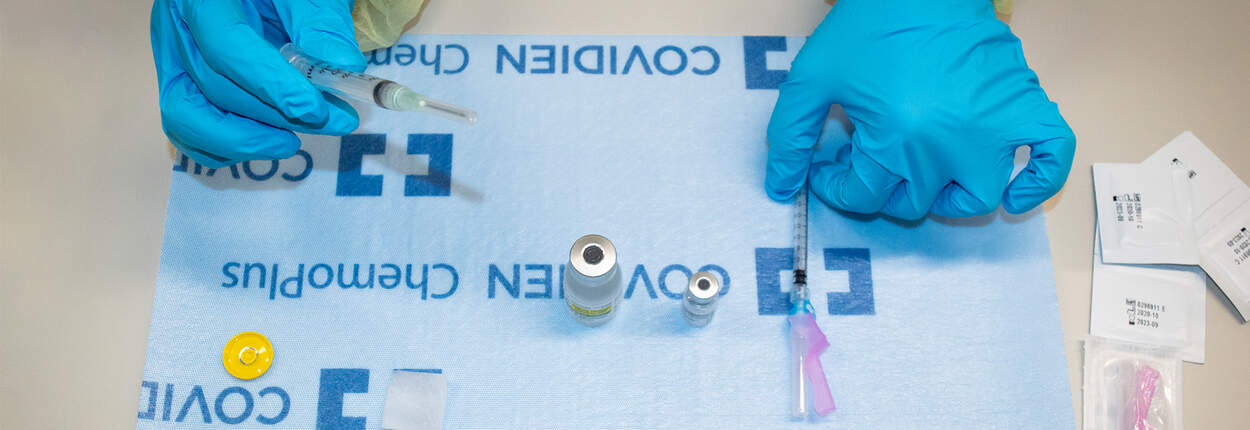
Pharmacy leads COVID-19 vaccine preparation at U of T-hosted clinic
Pharmacists are playing a critical role at the COVID-19 vaccine clinic hosted on the University of Toronto’s St. George campus.
“We’ve essentially opened a pop-up pharmacy in a short period of time,” said Linda Dresser, Assistant Professor (Status) at the Leslie Dan Faculty of Pharmacy and pharmacy director of the vaccine clinic.
“The speed with which we have come together to effectively open the clinic has been truly impressive.”
“This wouldn’t be possible without the strong support and collaboration of our faculty members and pharmacist colleagues across the University and the Toronto Academic Health Sciences Network,” said Lisa Dolovich, Professor and Dean at the Leslie Dan Faculty of Pharmacy. “The speed with which we have come together to effectively open the clinic has been truly impressive.”
Launched last week, the Toronto Public Health-approved clinic is a satellite site of the University Health Network (UHN) vaccine clinics, managed and operated in collaboration with the University of Toronto and Sinai Health. It operates by appointment only and follows the vaccine priority schedule and ethical guidelines established by the province.
“The U of T health sciences community is committed to helping with the vaccine effort — one of the most important public health initiatives of this century — and pharmacy is essential to our collective success,” said Lynn Wilson, Professor and Vice Dean of Clinical and Faculty Affairs at the Temerty Faculty of Medicine.
Dresser, a UHN staff member, leads the clinic’s pharmacy team. The team’s initial role is to manage vaccine preparation. Pharmacists are responsible for handling the vaccine from the point of delivery to the clinic through to handing-off prepared doses that are ready for injection.
“If these behind-the-scenes processes to prepare the vaccine don’t work really well, it could lead to downstream issues such as long waits or delays in vaccine administration,” said Dresser.
Inside look at pharmacists prepping vaccine behind the scenes
Here’s how it works: pharmacists arrive at the clinic two hours before it opens to receive the vaccine, which arrives in a cooler delivered by UHN. Dresser and her team are responsible for ensuring the cold chain is maintained. They receive the vaccine, check to ensure the temperature consistently remained in the appropriate range, then store and monitor the vaccine vials inside clinic fridges.
“These technical documentation steps are critical for ensuring safe handling of vaccine vials and limiting waste,” said Dresser.
Then, the pharmacy team prepares the vaccine supply using careful aseptic technique. Each vaccine vial must be handled with incredible care, with no shaking, swirling or dropping. Each vial is diluted and drawn into multiple syringes to ensure a steady flow of individual doses that are ready for injection.
“Considerable finesse and technique are required to reliably draw multiple doses out of each vial so we trained a group of pharmacists to repeat these steps multiple times,” said Dresser, explaining how important a structured process is for efficiency. She says that pharmacists are also responsible for managing the process of keeping the empty vials to ensure they’re recorded as empty and then safely destroyed.
The 20-person vaccine clinic pharmacy team attended weekend training sessions leading up to the clinic opening. Dresser and her colleagues issued a call to pharmacists working across the Toronto Academic Health Sciences Network — which included a number of LDFP faculty, alumni and preceptors — for anyone interested in working in this new clinic.
Training included a mix of online modules and in-person practice. Dresser worked with a large group of faculty, staff and students to deliver the training, including Associate Professor David Dubins, Assistant Professor Natalie Crown, Assistant Professor Sandra Bjelajac Mejia, Assistant Professor Marcia McLean and Peter Zhang, a combined PharmD/MBA student at U of T, on workshop training materials, technique coaching, operations and logistics.
During each in-person session, a pharmacy technician provided a refresher on aseptic technique, demonstrated the vaccine preparation steps, coached the pharmacists as they practiced doing these steps themselves, and built confidence in handling the delicate vials. Ultimately this training supported team building within this arm of ‘Team Vaccine.’
While compounding using aseptic technique is part of every pharmacists’ scope of practice, for many it is not a routine part of their practice.
“You can imagine the pressure to meet the demand while working with a temperamental product,” said Dresser.
Upcoming role for health sciences students and learners
When the clinic opened, it administered 100 doses each day. By the end of March, Dresser expects the vaccination rate to increase to more than 1,000 doses per day. As the vaccine clinic continues to ramp up, Dresser anticipates that there will be opportunities for pharmacy technicians, pharmacy students and other health profession learners to help. Pharmacists may also participate in vaccine injections and follow up with those who have received vaccinations at the clinic.
“We know there are many students waiting to lend their support,” said Jamie Kellar, Associate Professor and Associate Dean, Academic at LDFP. “We aim to bring students from across the health disciplines into the space, both to contribute to their learning as well as to build capacity to support the province-wide vaccine roll-out.”
According to Erin Bearss, Medical Director of the COVID-19 Vaccine Clinic and Assistant Professor in the Faculty of Medicine’s Department of Family and Community Medicine, “The role of pharmacy as part of the interdisciplinary team is absolutely critical — our pharmacists are superstars!”
By: Nicole Bodnar
More News
Image
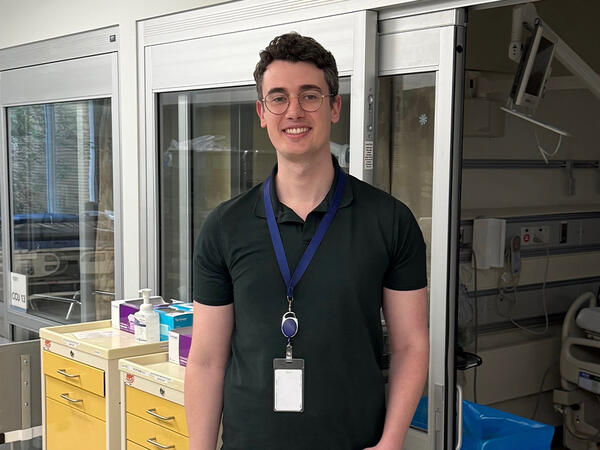
Pharmacy alum’s research shows how full-scope practice improves cancer care
Honoured with a national award, Adrian de Boer says his residency experience was a powerful reminder that he's making a meaningful change to the pharmacy profession.
Read More
Image

Pharmacy alum passionate about helping community pharmacists practice to full scope
As a pharmacy leader at Rexall, Heidi Wittke uses frontline experience to lead initiatives that improve patient care
Read More
Image
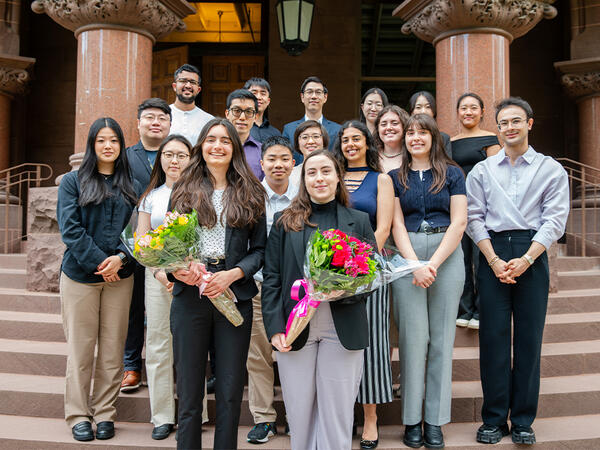
Bridging Research and Industry: GRIP 2025 highlights innovation and real-world impact
Over 200 attendees from academia, healthcare, and industry gathered last week for the 2025 GRIP symposium, celebrating the depth and diversity of graduate student research.
Read More
